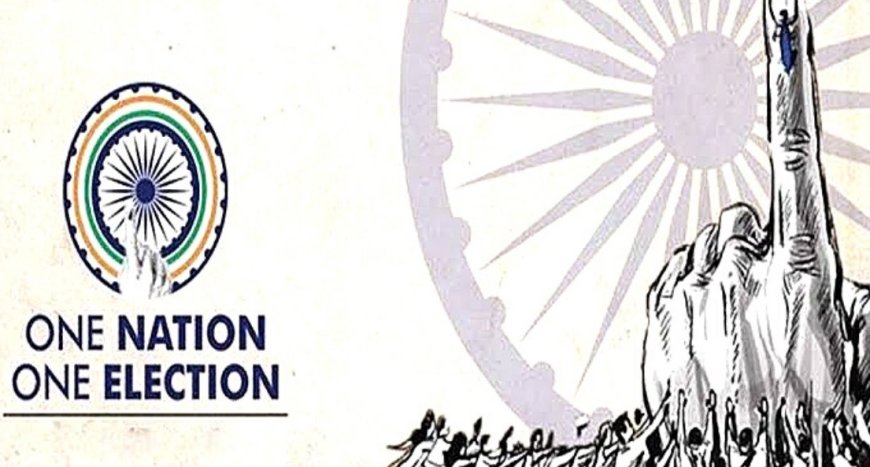Why are simultaneous elections harmful to India's democracy?

There is also a possibility that the federalism of the country will be challenged by simultaneous elections. There is a danger of simultaneous elections blurring these specific platforms and areas of democracy, as well as the risk that state-level issues get subsumed into national issues. If elections for the Lok Sabha and State Assemblies are held simultaneously, there is a greater possibility that regional issues may become secondary to national issues or, on the contrary, national issues may lose their existence in front of regional issues.
- Dr. Satyavan Saurabh
------------------------------------------------------------------------------------------------------------------------------------------------------------------------------
Simultaneous elections imply that elections to the Lok Sabha and all state assemblies across India will be held simultaneously, with voting possibly taking place around the same time. The idea of simultaneous elections, or "one nation, one election", was first formally proposed by the Election Commission of India in a 1983 report. Along with some potential benefits of holding simultaneous elections, there are also some drawbacks, which raise the question: Is holding simultaneous elections harmful to India's democracy?
Analysts against One Country One Election believe that the Constitution has provided us with a parliamentary model under which the Lok Sabha and the Legislative Assemblies are elected for five years, but our Constitution is silent on the issue of holding simultaneous elections. Many provisions in the Constitution appear to be completely contrary to this idea. For example, under Article 2, Parliament can include a new state in the Indian Union and under Article 3, Parliament can create a new state, where separate elections may have to be held. Similarly, according to Article 85(2)(b), the President can dissolve the Lok Sabha and according to Article 174(2)(b), the Governor can dissolve the Legislative Assembly even before five years. Under Article 352, the tenure of the Lok Sabha can be extended by imposing a national emergency in the event of war, external aggression, or armed rebellion. Similarly, under Article 356, President's rule can be imposed in the states, and in such a situation, the possibility of re-election increases due to an unexpected reversal in the political equation of the concerned state. All these circumstances are completely contrary to one country one election.
Holding simultaneous elections would require a constitutional amendment to coordinate the terms of the State Legislative Assemblies with the terms of the Lok Sabha. In addition, the Representation of the People Act as well as other parliamentary procedures would require amendments. The main fear of regional parties regarding simultaneous elections is that they will not be able to raise their local issues strongly, as national issues will take center stage. Additionally, they will not be able to compete with national parties in terms of election expenditure and election strategy. There is also a possibility that the federalism of the country will be challenged by simultaneous elections. There is a danger of simultaneous elections blurring these specific platforms and areas of democracy, as well as the risk that state-level issues get subsumed into national issues.
Blurred attribution prevents voters from holding governments accountable for poor performance or rewarding them for good performance. Having separate elections for different levels of government makes it clear to the voters which level of government is responsible for what and focuses on the performance of the respective government. The result will be a strong effort to save the government from collapse, even if it would, under normal circumstances, have lost the confidence of the House. There is a possibility of an explosive situation of horse-trading if elections are held simultaneously.
One Nation, One Election would be contrary to the federal structure of the country and would be a fatal step for parliamentary democracy. If elections for the Lok Sabha and state assemblies are held simultaneously, the tenure of some assemblies will be increased or reduced against their wishes, which may affect the autonomy of the states. The federal structure of India is inspired by the parliamentary system of governance and the frequency of elections in the parliamentary system of governance is an irrefutable fact. If elections for the Lok Sabha and State Assemblies are held simultaneously, there is a greater possibility that regional issues may become secondary to national issues or, on the contrary, national issues may lose their existence in front of regional issues. The nature and issues of Lok Sabha and Assembly elections are completely different. While Lok Sabha elections are held to form the national government, Assembly elections are held to form the state government. Therefore, while issues of national importance are given prominence in the Lok Sabha, issues of regional importance remain at the forefront in the Assembly elections.
Democracy is called the rule of the people. Being a parliamentary system in the country, elections are held at different times and the public representatives have to remain continuously accountable to the public. Apart from this, no party or leader can act autocratically after winning an election because it has to face some elections at short intervals. Analysts believe that if both elections are held simultaneously, the chances of this happening will increase. India is the second largest country in the world in terms of population. Therefore, in the absence of a large population and infrastructure, it does not seem logical to hold elections for Lok Sabha and state assemblies simultaneously.
There are many compelling reasons in favor of simultaneous elections. However, achieving political consensus on holding simultaneous elections among different political parties, especially regional parties, is a legal and political challenge in itself. Therefore, there is a need to harmonize the views of stakeholders including national political parties, the Election Commission of India, bureaucrats, academicians, and experts on the proposal of holding simultaneous elections in the country. There is no doubt that India, the world's largest democracy, seems to be surrounded by an electoral maze all the time.

 Yash Saini
Yash Saini 





